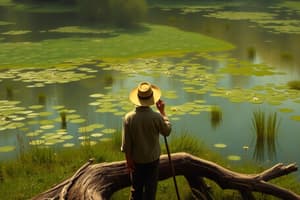Podcast
Questions and Answers
What is an ecosystem?
What is an ecosystem?
- A living part of an ecosystem
- All the living and nonliving things that interact in an area (correct)
- A relationship between two species
- The study of interactions among organisms
What is a habitat?
What is a habitat?
the place where an organism lives and that provides the things it needs
What is an abiotic factor?
What is an abiotic factor?
a nonliving part of an ecosystem
What is a biotic factor?
What is a biotic factor?
What is photosynthesis?
What is photosynthesis?
What is a species?
What is a species?
What is a population?
What is a population?
What is a community?
What is a community?
What is ecology?
What is ecology?
What is a biome?
What is a biome?
What is predation?
What is predation?
What is a predator?
What is a predator?
What is prey?
What is prey?
What is a niche?
What is a niche?
What is natural selection?
What is natural selection?
What is adaptation?
What is adaptation?
What is competition?
What is competition?
What is commensalism?
What is commensalism?
What is parasitism?
What is parasitism?
What is a parasite?
What is a parasite?
What is a host?
What is a host?
What is mutualism?
What is mutualism?
What is a producer?
What is a producer?
What is a consumer?
What is a consumer?
What are herbivores?
What are herbivores?
What are carnivores?
What are carnivores?
What are omnivores?
What are omnivores?
What is a scavenger?
What is a scavenger?
What are decomposers?
What are decomposers?
What is a food chain?
What is a food chain?
What is a food web?
What is a food web?
What is an energy pyramid?
What is an energy pyramid?
Flashcards are hidden until you start studying
Study Notes
Key Concepts in Ecology
- Ecosystem: Combination of living (biotic) and nonliving (abiotic) elements interacting in a specific area.
- Habitat: Specific location where an organism resides and obtains necessary resources for survival.
- Abiotic Factors: Nonliving components such as water, air, and minerals influencing ecosystem dynamics.
- Biotic Factors: Living organisms within an ecosystem that interact and affect each other's survival.
Organism Dynamics
- Photosynthesis: Process by which organisms convert sunlight, water, and carbon dioxide into food, essential for plant life.
- Species: A grouping of similar organisms capable of producing fertile offspring.
- Population: All individuals of a particular species inhabiting a defined area.
- Community: Diverse populations coexisting within a specific environmental space.
Foundation of Ecology
- Ecology: Scientific discipline exploring the interactions among organisms and their environments.
- Biome: Larger regional classifications of ecosystems sharing common climatic conditions and life forms.
Interactions and Relationships
- Predation: Interaction where one organism (predator) kills and consumes another (prey), crucial for regulating populations.
- Niche: A specific role played by an organism within an ecosystem, including its habitat and interactions.
- Natural Selection: Evolutionary mechanism favoring individuals better suited to their environments, enhancing survival and reproduction.
Adaptation and Competition
- Adaptation: Traits and behaviors developed by species that enable success in their environments.
- Competition: Rivalry among organisms for limited resources like food, space, and mates, influencing population dynamics.
Ecological Relationships
- Commensalism: Symbiotic relationship where one species benefits while the other is neither helped nor harmed.
- Parasitism: Relationship wherein one organism (parasite) benefits at the expense of another (host), often causing harm.
- Mutualism: Interdependent relationship where both species involved benefit.
Trophic Levels
- Producers: Organisms that generate their own food, forming the base of the food web.
- Consumers: Organisms that derive energy by consuming other organisms, categorized into herbivores, carnivores, and omnivores.
- Scavengers: Carnivores that eat dead organisms, facilitating nutrient recycling.
- Decomposers: Break down dead material, returning vital nutrients to the ecosystem.
Energy Flow
- Food Chain: Linear sequence depicting energy transfer as one organism consumes another.
- Food Web: Complex interrelated networks of multiple food chains in an ecosystem, illustrating diverse dietary relationships.
- Energy Pyramid: Represents energy flow between trophic levels, indicating energy loss at each transfer from producers to consumers.
Studying That Suits You
Use AI to generate personalized quizzes and flashcards to suit your learning preferences.




